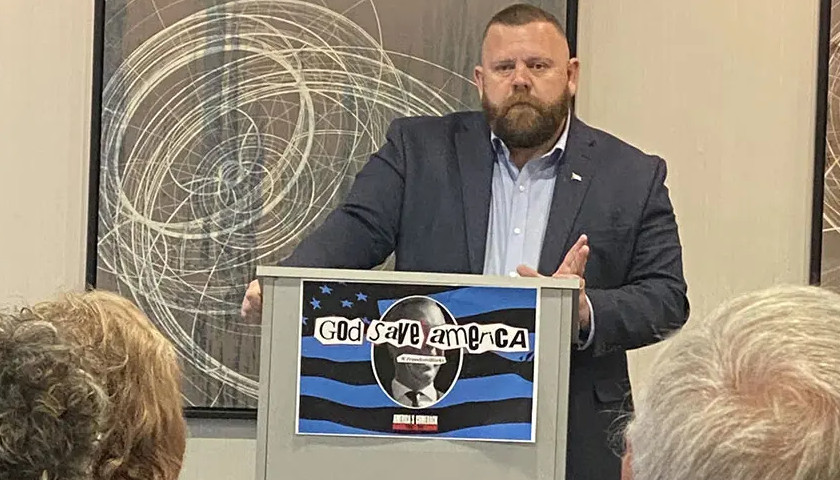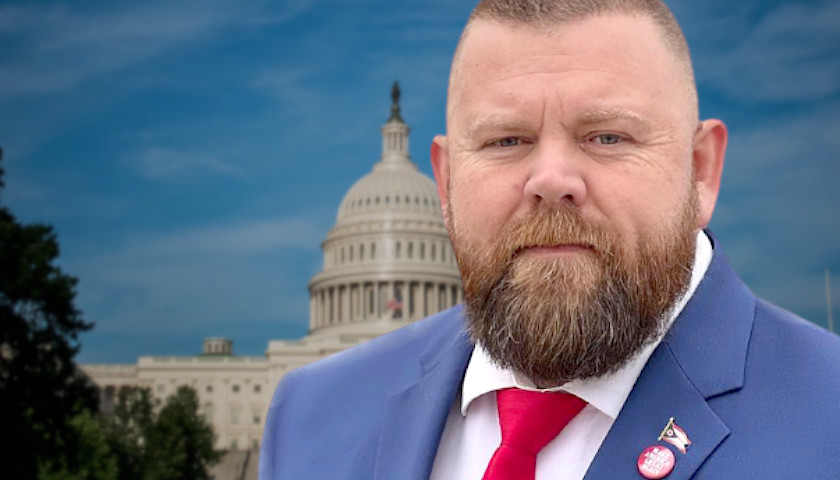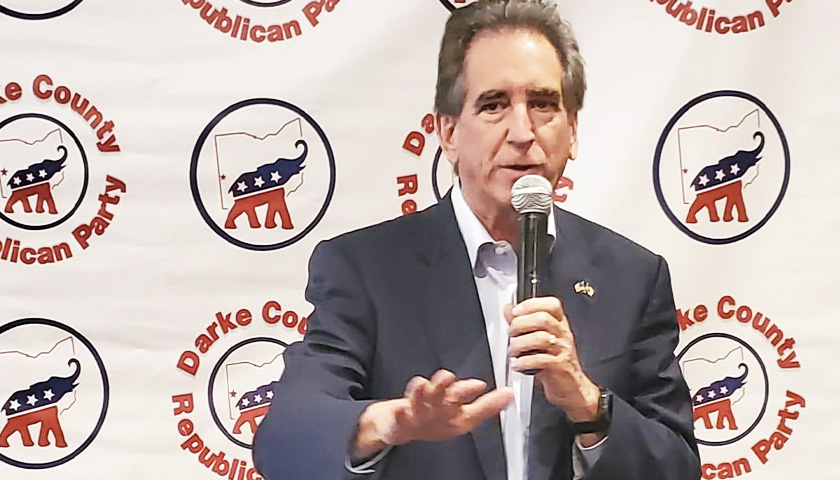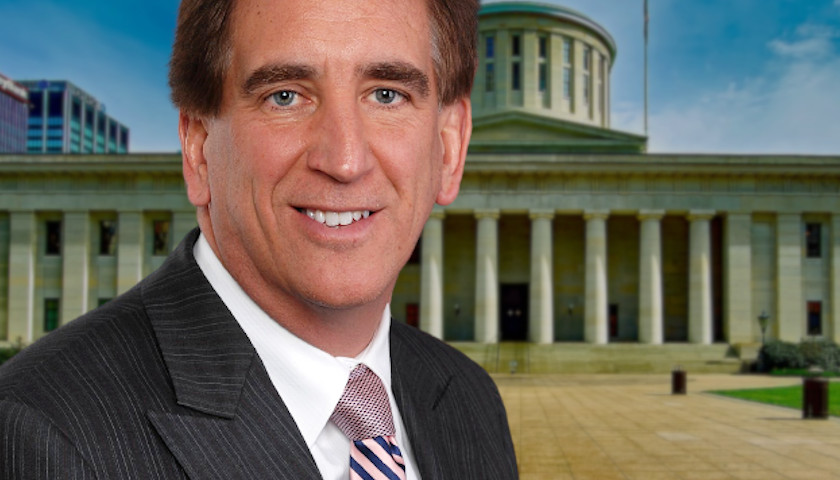COLUMBUS, Ohio – Four lawmakers – State Senators Matt Dolan (R-Chagrin Falls) and Stephanie Kunze (R-Hilliard), and State Representatives Nino Vitale (R-Urbana) and Andrea White (R-Kettering) – were the sole Republicans that did not cast a vote to override Gov. Mike DeWine’s veto of a measure that limits his authority to issue orders during an emergency.
Senate Bill 22 (SB22) is aimed at rebalancing power by giving the Ohio Legislature oversight of government rules and orders. Chairman of the House State and Local Government Committee Scott Wiggam (R-Wooster) was the point man in the lower chamber on the legislation, which passed overwhelmingly earlier this month.
Following through with his warnings, Governor DeWine vetoed the measure Tuesday, ten days later. The following day, the Senate and House both took up the bill, and both chambers voted to override the veto.
State Senators Dolan, Kunze, and State Rep. White all joined Democrats to oppose the override. State Rep. Vitale did not cast a vote.
The Star sent email messages to Senators Dolan and Kunze as well as Representative Andrea White asking why each voted “no.”
Senator Dolan was the only to respond – he sent a statement which can be viewed in full below.
[wonderplugin_pdf src=”https://tennesseestar.com/wp-content/uploads/2021/03/SB-22-veto-override.pdf” width=”650″ height=”866px” style=”border:0;”]
Dolan stated that he voted for SB22 prior to a veto but did not favor a veto override because post-veto, the legislature didn’t engage to create an acceptable bill, rather simply voted to override without exception for the Governor’s objections. He also claims the legislature had the authority – by passing a law – to check the power of the Governor and state agencies all along and criticizes the ability of the General Assembly to “rescind orders the very next day” under SB22.
Dolan’s two primary objections to the bill, per his statement are: 1) He alleges he bill strips local health departments of the ability to act quickly and efficiently during a public health emergency; 2) the law dismantles the court of claims procedure Ohio has had in place since 1975.
Representative Vitale, who has been an outspoken opponent of Governor DeWine and Ohio’s handling of COVID, agreed to an interview with Bob Frantz on AM1420 WHK in Cleveland – to discuss why he did not support the override.
The full interview can be heard here, beginning at 20:30 and ending at 36:00.
Vitale cited his commitment to the Ohio Constitution and the U.S. Constitution as a basis for not voting for SB22. “Right out of the gate Senate Bill 22 had many good things in it, but at 5:17 p.m., a large amount of text was put into the bill and then a large amount of text was taken out.”
He continued, “Why in the dark of night, after five o’clock did they radically change a bill and then vote on it the next day? And when no one could even find a copy of the bill, including me, as a Representative, had a difficult time finding the bill?”
The Urbana Republican said his biggest problem with the bill is that “the House and Senate can make a concurrent resolution to rescind orders of the Governor.” According to Vitale, the General Assembly has always had the power, under Article 2 of the Constitution of the State of Ohio, to change or rescind the powers for the Governor.
Vitale’s concern about the constitutionality of a concurrent resolution is in direct opposition to attorney Maurice Thompson who told The Star in an interview that SB22 “would be the bill making the law defining the scope of administrative power;” adding, “the legislature has not just the authority, but the duty, to limit that power.”
Thompson, of 1851 Center for Constitutional Law, made recommendations and wrote pieces of the House Bill 90 and senate Bill 22.
SB22 passed both chambers on March 10 and was sent to Republican Governor Mike DeWine who waited the full 10 days allowed by law before vetoing – that happened on Tuesday.
On Monday Wiggam told The Ohio Star that if the Ohio Senate voted to override a DeWine veto of Senate Bill 22 on Wednesday, he believed the House would act the same day. The concern Wiggam expressed was whether DeWine would “pick off” Representatives who publicly committed to vote in favor of a veto override.
Just one day following DeWine’s veto, the Republican supermajority Senate voted 23-10 to override the veto.
Almost immediately following the vote on the Senate floor, the bell rang in the House, calling members into session. There, SB22 was immediately sent to the floor for discussion and then voted on – 62-37 in favor of the legislature providing oversight of executive branch special and standing orders.
It’s probable that the bill was considered so expeditiously to eliminate the risk Wiggam mentioned – the Governor having time to turn members of his own party.
On Thursday, during a COVID briefing, Governor DeWine was asked if he plans to challenge the bill’s lawfulness but expressed sentiment similar to what he said the day before to The Star and other media outlets – “It is too early to tell if there will be legal action. Governor DeWine will review the issue with legal counsel.”
DeWine also said he made several points expressing his concern in a letter he wrote earlier in the week to lawmakers and that he echoed in his statement of reasons to veto the bill. Thompson found eight points he claimed are “false” in DeWine’s note and three points he called “irrelevant.” He added that the “Governor lied so much in the letter.”
Soon after DeWine wrote to members of the General Assembly, Wiggam countered with his own five-page message addressing the Governor’s stated concerns.
The points of contention between the DeWine – who previously served as Ohio’s Attorney General – and Wiggam are reported below with direct quotes from each of their letters – beginning with DeWine, followed by Wiggam’s rebuttal.
DeWine’s letter: “SB 22 strips local health departments and the Ohio Department of Health (ODH) of their ability to protect Ohio citizens from these possible future threats. The bill prohibits a local health department and ODH from requiring someone to quarantine or isolate unless there has been a specific medical diagnosis of that person or unless that person has come in direct contact with someone who has been “medically diagnosed.”
Wiggam’s response: You gave several hypothetical scenarios that the requirement in S.B. 22 “could result in a serious tragedy.” Even though the ultimate authority to quarantine and isolate has been codified since 1886, your letter does not identify a single real-world example of an instance where that power has been used to prevent harm, instead using the terms “if” and “assume” to raise only hypothetical scenarios which will either never occur or could be dealt with through the use of R.C. 3701.13 or R.C. 3701.14.
DeWine’s letter: “1. In January 2020, two Miami University students returned to campus from Wuhan China. At that time, coronavirus tests did not exist in Ohio, so to determine if the students had the virus, their tests had to be sent to the Centers for Disease Control and Prevention. While awaiting the test results, which took more than five days, the Butler County Health Department asked the students to self-quarantine, which they did. Under SB 22, if they had refused, neither the Butler County Health Department nor the Ohio Department of Health would have had the authority to require the students to quarantine before they were medically diagnosed.
And so, if the students had refused to quarantine and they had the virus, they could have infected a number of Miami University students and other Butler County citizens. The Butler County Health Department and ODH would have been helpless to stop this spread. Without immediate access to testing results, it might be impossible to medically diagnose a person, especially someone who is asymptomatic. Such a situation could certainly happen again with a future novel virus.”
Wiggam’s response: 1. Under current law, the Executive branch would not have been able to quarantine the two students as there was no epidemic or pandemic in Ohio at the time and would not be able to do so in the future under current law in the same situation. The local board of health can still ask future students to self-quarantine. In the entire year of this pandemic, there is not one instance where the Executive branch actually quarantined foreign nationals flying into Ohio’s international airports. If there is a concern, the U.S, Department of State and CDC can take measures to quarantine such individuals or stop such flights.
DeWine’s letter: 2. Ebola exists in certain parts of Africa. Today in Ohio, health officials are actively monitoring 44 people who have returned from areas of Africa with active outbreaks of Ebola. While it is currently believed these individuals are at very low risk of having contracted Ebola, if one of them develops symptoms, SB 22 would prevent our public health apparatus from swinging into rapid action and taking decisive steps to isolate, quarantine, and protect the public from the threat of this deadly virus until a medical diagnosis can be obtained.”
Wiggam’s response: 2. The federal government controls access to the United States. If there was a particularly serious outbreak from a particular country, again the U.S. Department of State would prohibit travel from those countries. Furthermore, the officials actively monitoring the 44 individuals who are still waiting for EVD symptoms could simply ask for the test in lieu of symptoms.
DeWine’s letter: “3. Under SB 22, if terrorists or a foreign country introduced smallpox or the plague into Ohio, neither local health departments nor the Ohio Department of Health would have the power to appropriately quarantine or isolate anyone without a required medical diagnosis. Spread would be the inevitable result.”
Wiggam’s response: 3. If the United States is attacked by any weapon, biological or otherwise, neither the local board of health nor the state DOH would have jurisdiction for response. That responsibility would fall to the military in conjunction with the CDC and FEMA. Martial law can be implemented by the federal government under those circumstances.
DeWine’s letter: “4. SB 22 also limits health departments’ ability to respond to food-borne illnesses. For example, assume there is a Norovirus outbreak in a restaurant that makes over 500 people severely ill, and it is traced back to a cook. Under SB 22, even a symptomatic cook could not be made to isolate without a medical diagnosis, and it would be legally difficult and perhaps legally impossible to force a resistive cook to see a physician for a medical diagnosis. Therefore, the cook could continue to work in that restaurant or another restaurant, and the local health department would be powerless to stop the resulting spread of illness.”
Wiggam’s response: 4. A health department could close down a restaurant for a Norovirus outbreak. By the time a health department could figure out that the cook was spreading it, the cook would no longer be contagious. Are health departments or the DOH seriously asking for the authority to isolate people they think may have a Norovirus? Furthermore, no power within 3701.13 is required to address food-borne illnesses, which already fall within the domain of R.C. 3717.49(C)(1) (“On determining that a license holder is in violation of any requirement of this chapter or the rules adopted under it applicable to food service operations and that the violation presents an immediate danger to the public health, the licensor may suspend the food service operation license without giving written notice or affording the license holder the opportunity to correct the violation.”).
DeWine’s letter: “SB 22 makes a dramatic change in how and where the State can be sued. It would:
- Eliminate Ohio’s long-standing sovereign immunity protections, authorizing an award of monetary damages against the State for actions taken pursuant to an emergency order;
- Permit class action treatment of the newly authorized damage claims with potential massive financial exposure to the State;
- Provide attorneys’ fees awards against the State even if the plaintiff does not ultimately prevail on all or even the main issues;
- Allow lawsuits against state agencies in every county, even if no action has been taken in that county; and
- Authorize suits against the General Assembly, itself.
The bill provides that when a “state of emergency” has been declared, anyone who feels aggrieved by the actions as a result could sue for damages and attorneys’ fees. The bill would take suits for damages against the State out of the Court of Claims, where they have been for over 40 years, and allow them to be filed in any county where a plaintiff lives –irrespective of the geographical region covered by the challenged order.
It is important to remember that most “states of emergency” have nothing to do with health orders. Rather, they might be issued as a result off lodindg along the Ohio River, a tornado in western Ohio, a washed-out road, or a prison riot (remember Lucasville?).So, for example:
- A state of emergency was declared for the Republican National Convention in 2016, when it was hosted in Cleveland. SB 22 would give any group that did not like the resulting orders issued by the State a legislatively-approved path to sue in any county in Ohio –not just in Cuyahoga County. So, let’s suppose that during the Republican National Convention, the Ohio Director of Public Safety ordered certain state routes to be shut down in Cuyahoga County, but an activist group, with members from several different Ohio counties, didn’t like that. Under SB 22, suits against the Public Safety Director could be filed in each county where an activist member lives –not just in Cuyahoga County where the orders were invoked.
- Imagine if a weather emergency is declared after a series of tornados in western Ohio. The Public Utilities Commission (PUCO) issues a waiver (which would qualify as an order under SB 22) for the number of hours a truck driver can work to haul storm debris away in the affected area. Under SB 22, a clear legal pathway is given to sue the PUCO both to challenge the waiver and to its duration. So, you could have Trucking Company A file a lawsuit in a county in northeast Ohio, where it is headquartered, to expand the waiver, while you could also have Trucking Company B file a lawsuit to rescind the waiver in a county in southeast Ohio, where that company is headquartered. Both courts would have jurisdiction and venue under SB 22, and both courts could come to a different conclusion –all in the middle of an emergency, creating chaos at the worst possible time.
- What would happen if a sustained prison riot erupted in one of our prisons, creating an institutional takeover with hostages? When a state of emergency is declared, the Governor could issue certain lawful orders, such as cutting the power and water at that prison. Under SB 22, any inmate’s family members could run into their local court and sue the Governor to prevent those orders from taking effect. That could result in the judicial handcuffing of the Executive Branch when trying to deal with a dangerous hostage situation.”
Wiggam’s response: Sovereign immunity is not eliminated. One cause of action is created to give local citizens the opportunity to contest illegal orders of the government. Attorney fees are only available when the plaintiff proves the government issued an illegal order.
The lawsuit can only take place in the county where the individual was wronged. The State is not liable if it does not violate Ohioans’ constitutional rights. Even if it does, it remains protected by sovereign immunity. Further, S.B. 22 simply permits adjudication that currently takes place in the Court of Claims in Columbus, i.e. lawsuits for damages against the State, to take place before elected judges in Ohioans’ home counties.
Rather than “creating a special pathway,” S.B. 22 is patterned after 42 U.S.C. Section 1988 (State liable for prevailing parties attorney’s fees), R.C. 163 (State liable for prevailing parties attorney’s fees in eminent domain actions, R.C. 2335.39 (providing that “the prevailing eligible party is entitled, upon filing a motion in accordance with this division, to compensation for fees incurred by that party in connection with the action or appeal”); and R.C. 733.61 (Cities liable for attorney’s fees when “taxpayers allegations are well[1]founded”). Pursuant to each statute, the plaintiff must prevail. Accordingly, S.B. 22 simply creates uniformity by eliminating an anomalous immunity, such that citizens whose rights the State has verifiably violated may recover the cost of having to prove so in state court.
Under the second scenario you write, “…different courts could come to a different conclusion on the same issue, all in the middle of an emergency.” This is true now. And S.B. 22 does nothing to alter or abandon this reality. In fact, after Courts of Common Pleas in Lake and Erie Counties determined that the Executive branches pandemic orders were unconstitutional, your attorneys urged latter Ohio courts of common pleas to ignore those rulings and come to a different conclusion on the same issue, all in the middle of an emergency.
In regards to “states of emergency”, if the state does not act illegally, there is no issue. However, the prison example is very concerning. The insinuation is that you do not want the court to interfere if there is an emergency at a prison. Isn’t that why we have courts? What if a future governor goes too far in response to the “riot”? Instead of cutting off power, what if they try to starve out the prisoners or cut off water and sanitation? Should that be permissible? The courts should be the venue to determine whether the response passes constitutional muster.
DeWine’s letter: “SB 22 also limits a local health department’s ability to issue a general order to potentially impacted groups if it is unable to precisely identify the impacted persons. For example, if the source of E. coli were determined to be romaine lettuce from a particular supplier, but the local health department did not know which restaurants had received the lettuce in question, SB 22 would prevent the local health department from issuing a general order requiring a class of persons (i.e., all restaurants within its jurisdiction that received romaine lettuce from that supplier) to destroy the contaminated lettuce. Under SB 22, orders may be issued only to specific persons, and any order or regulation that applies to a class of persons would be invalid and have no legal effect.
Wiggam’s response: Local districts can still shut down individual restaurants for health code violations. The example given would be a health code violation at a particular restaurant. If it is system wide, say bad beef at a hamburger franchise, the local board would not have jurisdiction. The U.S. Food Inspection Service is responsible for recall of tainted meat and the prevention of consumption thereof. Same goes for the Food and Drug Administration if it is a recall of anything other than meat, poultry or eggs. Those are the domains of the USFIS.
DeWine’s letter: “While the intent of SB 22 is to give the General Assembly more power in regard to health orders, the bill would result in public health policy really being made by individual courts in as many as 88 Ohio counties!
If a state of emergency is declared, SB 22 creates a special pathway to filing lawsuits that is easier and potentially very profitable for trial attorneys. So, at precisely the times that government must act with focus and resolve making immediate, decisive, gut-wrenching, and often unpopular decisions, SB 22 flings the Courthouse doors wide open for immediate judicial intervention. SB 22 not only allows for this, but encourages it through potentially lucrative attorneys’ fees and damage awards against the State. And, SB 22 makes jury trials available to those plaintiffs.
Courts, via these lawsuits, will be the branch of government shaping the response to an emergency, even if that emergency is not happening in the courts’ normal jurisdiction. Courts, by design of our system of government, are the least equipped of the branches to shape an emergency response –but SB 22 forces this into their lap.
Wiggam’s response: The courts wouldn’t be making health policy. They would decide if the administration violated the constitution or state law under the guise of an emergency or a health order. That is the purpose of the court.
DeWine’s letter: Some of you have heard from your state universities expressing serious concerns about SB 22 and the impact it would have on their future. Since 1974, suits for damages against the State, including state universities, have been required to be filed in the Court of Claims. SB 22 would allow lawsuits to be brought against universities for any order related to the state of emergency issued during a state of emergency, creating the possibility for them to be sued for money damages in the Court of Common Pleas in each of the 88 counties in which a student resides.
Further, if SB 22 became law, universities’ efforts to protect students living in dormitories, such as mask orders or isolation of students who test positive for COVID-19, would be subject to damage claims in Common Pleas courts. And, under SB 22, recent extreme weather conditions could create a weather emergency potentially giving rise to a damage claim when classes are cancelled or dormitories are closed.
Wiggam’s response: Universities do not issue the type of rules or orders identified by S.B. 22. Further, Ohio universities are already subject to suit in their home county, and may be sued for damages in federal court in the home venue of the university.
Universities benefit from the same sovereign and qualified immunities identified above. Under S.B. 22, a plaintiff aggrieved by a State rule or order (enforced by a university, presumably), may sue the State directly in his home county rather than having to sue the university so as to obtain venue in his home county, resulting in less litigation for universities.
Moreover, when a university has issued and enforced an unlawful order, there is a public good in permitting citizens whose rights have been violated to correct that matter before an elected Ohio judge.
DeWine’s letter: “The ability to sue the legislature itself would be dramatically expanded by SB 22. The bill’s broad definition of “state agency” also includes the General Assembly. As such, SB 22 would authorize suit in any county against the legislature and would authorize an award of damages and attorneys’ fees against the General Assembly if an order or rule that the General Assembly extended is ultimately invalidated, such as orders around employment during an emergency. This unprecedented authorization of suit would expose the members of the General Assembly to document and deposition discovery.”
Wiggam’s response: The G.A. would not be subject to suit pursuant to the authority granted under S.B. 22. The G.A. does not issue orders or rules. It legislates through bills and concurrent resolutions.
DeWine’s letter: “We believe that significant portions for SB22 are unconstitutional. Parts of the bill violate the separation of powers doctrine embedded in our Ohio Constitution; other parts violate Article II, Section 15 of the Ohio Constitution, proscribing how laws must be made; and even other parts of the bill likely violate Article VI, Section 5 of the Ohio Constitution, by exercising power reserved to the judiciary.
For all these reasons, I will veto SB22. I accept and respect legislative oversight. Its exercise is part of the responsibility of the Legislative Branch. As I have communicated to the Speaker of the House and Senate President, I still believe we can reach an agreement that will provide for that oversight, while at the same time protecting the health of the people of Ohio.”
Wiggam’s response: Section 15, Article II of the Ohio Constitution does indeed require the enactment of “laws,” by “bills,” but S.B. 22 is a “bill” making the “law” that governs the Executive branch’s exercise of its authority. The General Assembly is the only policymaking authority identified by the Ohio Constitution, and could eliminate administrative order and rulemaking authority entirely. The Separation of Power is violated by the delegation of authority without standards or limits to the Executive branch, and S.B. 22 attempts to place some conditions on the exercise of that Executive branch’s authority.
The Ohio Constitution does not grant emergency powers such as the ones claimed in your letter. All of those powers are statutory. They are given to the governor through legislation. The same is true for the DOH and agencies. Thus, the governor’s emergency powers are limited to those given to the office by statute. Not only can the G.A. grant the governor the authority, it can also take it away through legislation. The G.A. can also limit the authority it grants or make the authority it grants conditional. That is precisely what S.B. 22 does. Ultimately, the Court must decide if the bill is constitutional, not the governor.
In conclusion, your letter suggests that the Executive branch of government has or at least should have absolute unfettered authority whenever it decides to declare an emergency or issues an order. This type of power would mean that the governor should make the law, enforce the law, and do so without any possibility of judicial oversight. This type of autocratic rule must be checked by the Legislature and should be tested in the courts because I believe it is not only unacceptable, it is also unconstitutional. An Executive branch that has the unchecked power to issue a “stay at home order” to healthy citizens or prevent all citizens from being out past 10 p.m. under the threat of arrest, simply has too much power.
– – –
Jack Windsor is the Statehouse Reporter at The Ohio Star. Windsor is also an independent investigative reporter. Follow Jack on Twitter. Email tips to [email protected].





